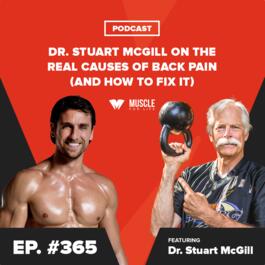
Dr. Stuart McGill on the Real Causes of Back Pain (and How to Fix It)
Back pain is the bane of athletes everywhere. About a third of adults deal with it at some point, and that number is even higher for us fitness folk. To make matters worse, the cause of back pain, and low-back pain in particular, is rarely obvious and notoriously difficult to diagnose. It also often strikes out of nowhere, lingers for a while, and then suddenly vanishes for no apparent reason. Or not—sometimes it sets in the for long haul. All this mystery, confusion, and frustration has made low-back pain a reliable honeypot for Internet profiteers, fake doctors, and supplement shysters who aren’t bothered one bit by cashing in on people’s pain. That’s why I wanted to talk to one of the most respected, experienced, and knowledgeable experts in the world on spinal health and function—Dr. Stuart McGill—to help cut through the noise and get an honest, practical, evidence-based take on treating back pain. Dr. McGill has spent over 30 years studying the mechanics of the spine and what causes back pain and how to safely and effectively treat it, has published several books including The Back Mechanic, and through his work has helped tens of thousands of people prevent and eliminate back pain without invasive surgery. In this interview, Dr. McGill and I start more or less from square one and then dive into the nitty gritty details and address a whole host of questions I get asked fairly often, including . . . -Is back pain always caused by structural damage? -Can you have structural damage without pain? -How do different forms of exercise affect the health of your back? -How common is degenerative disc disease? -What can people do to self-diagnose and heal their back pain? -When is surgery a good idea and when it is unnecessary? -And more. The bottom line is by the end, you’ll know more about the real science of back pain than 95% your fellow lifters (and more than many doctors and personal trainers). 6:28 - Does back pain mean good or bad structural damage? 16:24 - Can there be structural damage without pain? 25:16 - How does mechanical stimulation damage tissue and correlate to pain? 32:38- What options did the clinicians give your client? 36:49 - What are your thoughts on back surgery? 42:36 - What should back surgeons prove to their patient before recommending back surgery? 45:35 - What is a scenario that requires back surgery? 50:07 - Is deadlifting and squatting safe for the spine? 58:59 - What is the goldilocks zone for squatting and deadlifting? 1:10:51 - Where can people find you and your work? Want to get my best advice on how to gain muscle and strength and lose fat faster? Sign up for my free newsletter! Click here: https://www.muscleforlife.com/signup/
From "Muscle for Life with Mike Matthews"




Comments
Add comment Feedback